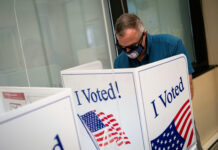Republican presidential presumptive nominee Donald Trump renewed his proposal to ban Muslims from entering the United States after the Orlando mass shooting—the deadliest terror attack since 9/11. His message seemed unappealing to the Republican establishment.
In a speech at New Hampshire yesterday, Trump emphasized the “growing threat of terrorism” inside the borders of the United States. He said, “A radical Islamic terrorist targeted the nightclub not only because he wanted to kill Americans, but in order to execute gay and lesbian citizens because of their sexual orientation.”
Trump criticized the current administration’s “politically correct” response that “cripples our ability to talk and think and act clearly.” He emphasized, “If we don’t get tough, and we don’t get smart – and fast – we’re not going to have a country anymore — there will be nothing left.”
The Republican presumptive nominee promised that if elected, he will use the power of the president to suspend immigration from areas of the world with proven history of terrorism against the United States and its allies.
He also criticized Hillary Clinton and suggested that she wants to allow radical Islamic terrorists to pour into the United States.
Trump’s reaction to Orlando mass shooting “opportunistic and shallow”
Political observers suggest the ordinary members of the Republican Party may respond positively on Trump’s message after the Orlando mass shooting. However, his message was not appealing to the Republican establishment particularly those experts in foreign policy.
In an interview with Reuters, Peter Feaver, a top National Security Council aide during the administration of George W. Bush, said, “It’s a missed opportunity to present a different image. He has doubled down on policies I oppose and that aren’t going to solve the problem.”
Max Boot, an influential conservative at the Council on Foreign Relations, said the Orlando mass shooting “could have provided an opening for Trump to rally Republicans against terrorism” instead he was “partisan and petty.
Boot condemned Trump for suggesting that President Barack Obama will probably sympathize with radicalized Muslims. He also criticized the Republican presumptive nominee for reviving his proposal to ban Muslims from entering the country. He said, Trump’s “performance has been in character, which is to say appalling.”
Eliot Cohen, a top-ranking official at the State Department during the Bush administration described Trump’s reaction to the Orlando mass shooting as “opportunistic and shallow” and “not what Americans expect from a president.”
Mitt Romney’s top aide during his 2012 presidential campaign, Lanhee Chen commented, “While it would be true in most cases a big speech like this could reset the decks, I think the challenge with Donald Trump is always who he is at his core.” He believed that Trump will not be able to refine his image.
Muslim ban is not in the best interest of the U.S.
House Speaker Paul Ryan rejected the Republican presumptive nominee’s proposal to ban Muslims. Ryan said. “I do not think a Muslim ban is in our country’s interests.”
“This is a war with radical Islam. It’s not a war with Islam. Muslims are our partners.” He added that the vast majority of Muslims in the United States and around the world are moderate, peaceful and tolerant. They are among the best allies and best resources of the United States in the fight against radical Islamic terrorism.









